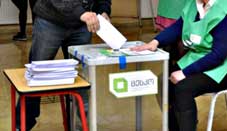
Elections in Georgia - Runoffs in Main Cities to Be Held on October 30
By Nika Gamtsemlidze
Monday, October 4
On Saturday, October 2, Georgians voted on municipal elections. A day after the arrest of Georgia's third president, many viewed Saturday's elections as one of the most critical votes in several years.
With over 1.8 million people who voted, the total activity of the election was 51.92% in the country.
According to the final numbers published by the Central Election Commission, the runoffs in the country will be held in all five big cities, including Tbilisi, Rustavi, Poti, Batumi, and Kutaisi, among others.
In Tbilisi, around 45% of people voted for Kakha Kaladze, the current mayor of Tbilisi, and 34% for UNM's Nika Melia.
In Kutaisi, the representative of the opposition Khatia Dekanoidze received over 43% of votes, and Ioseb Khakhaleishvili received about 41.5%.
The second round will be held in 20 cities or municipalities. According to the legislation, the second round will be held 4 weeks after the first round, which is on October 30.
According to the preliminary data of the Central Election Commission, Tbilisi Sakrebulo will be staffed with representatives of 6 parties.
According to the CEC, the Georgian Dream, the United National Movement, For Georgia, Lelo, Girchi – More Freedom, and For the People have passed the mandatory 2.5% threshold.
According to the preliminary data of the Central Election Commission, in the proportional part of the Tbilisi Sakrebulo, Georgian Dream is expected to win 19 seats, UNM- 13, Gakharia - For Georgia - 4, Lelo - 2, Girchi – More Freedom - 1 and For the People also 1.
The Georgian Dream has also won 9 out of 10 majoritarian constituencies in Tbilisi and already has a majority in the City Council.
The President of Georgia Salome Zourabichvili assesses the October 2, 2021 self-government elections as peaceful, fair, secure, and competitive. She said that this election was very important and thanked the voters for it.
After voting in the October 2 elections, the President of Georgia did not openly express who she supported but said that she was in favor of “depolarization”.
On the other hand, many of the opposition representatives talked about the problems that they encountered during the elections. Many complaints were filed during the elections due to alleged wrongdoings.
Representatives of the OSCE Office for Democratic Institutions and Human Rights (OSCE/ODIHR) held a press conference on October 3 on Georgia's local elections.
Albert Jonsson, head of the OSCE/ODIHR EOM, said that although the October 2 local elections were generally well run, the election process was taking place amid a protracted political crisis, with consistent allegations of intimidation and vote-buying.
The head of the OSCE monitoring mission also focuses on the characteristics of media work during the election period. According to him, the diverse media landscape was sharply polarized, and the acts of violence and intimidation against journalists are very concerning.
Shalva Papuashvili, a spokesman for the Georgian Dream, expressed satisfaction with the positively emphasized electoral reform by the OSCE/ODIHR.
Counting 100% of the votes does not mean final results as complaints about violations may result in the annulment or alteration of data in some precincts. The CEC will publish the results after the review of the complaints.
Before the announcement of the first results by CEC, there were several Exit Poll results released in the country. One of them was by Imedi TV and Gorbi, which initially showed that Kaladze would win Tbilisi without runoffs. Exit Polls of both Formula TV and Mtavari Arkhi showed there would be a second round in Tbilisi.



